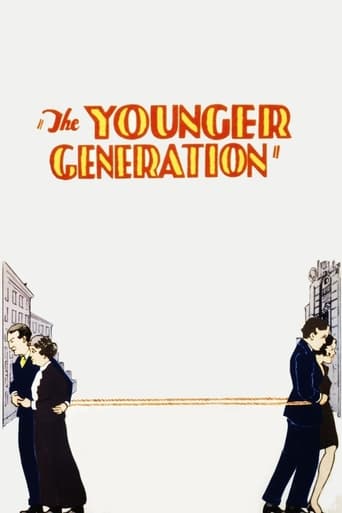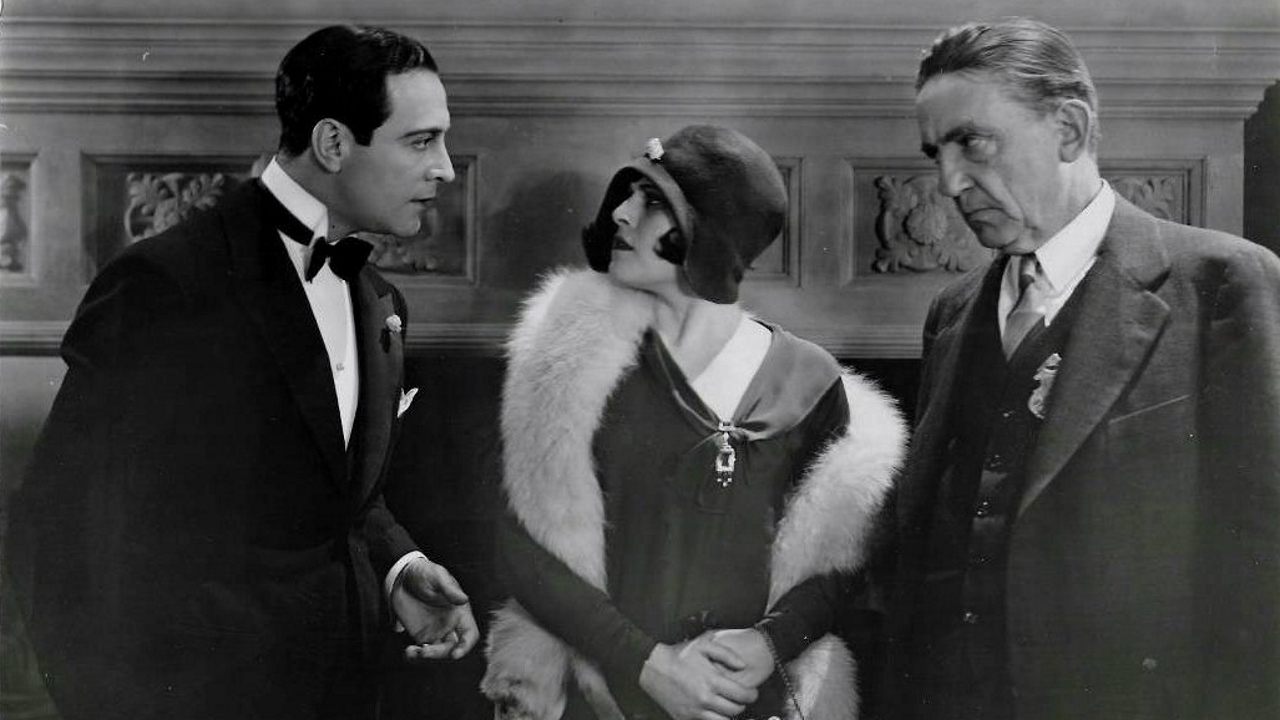Jimmy L.
THE YOUNGER GENERATION (1929) starts as a silent film, complete with synchronized audio track (for music and sound effects), but eventually lapses into an early talkie with spoken dialogue. The scenes alternate between silent and sound throughout the duration of the film. It's an interesting curiosity for film history buffs, as the movie was released at seemingly the exact moment when Hollywood transitioned from silent cinema to talking pictures.The story is nothing groundbreaking. The Goldfish family rises from the cultural melting pot of the Lower East Side to Fifth Avenue high society, thanks to son Morris (Ricardo Cortez), a shrewd businessman who grows the family furniture store into a successful antiques emporium.Morris rules his family with an iron fist, forbidding his sister Birdie (Lina Basquette) from seeing her childhood sweetheart from the old neighborhood. The ritzy Fifth Avenue lifestyle stifles Papa Goldfish (Jean Hersholt), who misses his friends from Delancey Street. Morris even legally changes his surname from Goldfish to the less-Jewish "Fish" in order to distance himself from his family's ethnic heritage.As an early talkie, many of the line readings are a bit awkward, though Basquette handles the dialogue better than the rest of the cast (even Cortez). But even with her naturalistic delivery, the lines are often written awkwardly.Still, the human drama pulls at your heart. Financial success brings misery to the Goldfish family. Morris is a real jerk, and everyone else in his house suffers as he climbs the social ladder. Cut off from her family, Birdie stitches together a happy little life with her songwriter husband, while Morris obsesses over his social position and leads an ultimately empty existence. Lina Basquette is pretty cute as Birdie and Jean Hersholt's performance is heartbreaking.
marcslope
A young Frank Capra slips easily into a milieu you wouldn't expect him to have much feel for--the Jewish Lower East Side--in this early talkie, adapted from a Fannie Hurst novel. Hurst wrote soap operas that validated the feelings of the common woman, but here she's more intent on portraying immigrant Jews, a subculture most of America probably knew and thought little about, with dignity and empathy. And the histrionics are effective. Capra always had a way with actors, and he helps Jean Hersholt, as the stuck-in-his-ways paterfamilias, and Lina Basquette, as a feisty but sympathetic daughter, to their best performances. Ricardo Cortez is more of a natural as the son than you think--he was born Jake Krantz. The early-talkie format, with some scenes with dialogue and others with titles and sound effects, is awkward--if we can hear footsteps and doors slamming, why can't we hear dialogue?--and the not-too-happy ending, with the son punished for his acquisitiveness, is a bit of a downer. But it's loaded with atmosphere, and shows Capra learning his trade quickly.
MartinHafer
THE YOUNGER GENERATION is a transitional film. In other words, it was originally a silent film but with the advent of sound in 1927, like many films in production it was held from release and hastily converted to sound. In some cases, such films were crudely overdubbed or all new scenes were added. Now it should be noted that most of these films were NOT 100% sound films, but bits and pieces of sound dialog were added here and there. This is even true to the groundbreaking 'sound' film, THE JAZZ SINGER--as most of the movie actually was still silent. By 1930, such practices were over in the US and films all films were 100% sound (with a few very rare exceptions, such as Chaplin's CITY LIGHTS). Interestingly, this conversion took many more years to take place throughout the rest of the world--with silents still predominating in China and Japan until the late 1930s.This is an interesting film because it's one of the few times in which leading man Ricardo Cortez played a Jewish man. This is interesting because although he had a Hispanic name, this was not his real name--and he was, in fact, Jacob Krantz--Jewish through and through. I guess the studio thought it best, but it seems sad that he publicly pretended to be something he wasn't. But, back in the 1920s and 30s, being a Jew certainly was NOT an asset for a handsome leading man.In addition to Cortez, the other interesting star in the film is Jean Hersholt. While this very prolific character actor may not be a household name, the Oscar's special award for community service was named after him, the Hersholt Humanitarian Award--as Hersholt was the man responsible for the creation of the actor's retirement home and hospital (among other such work).The film is in some ways like a reworking of the recent hit, THE JAZZ SINGER. Like the JAZZ SINGER, this story involves a Jewish family and a son who violates tradition--much to the consternation of his father. In this case, Cortez becomes very successful in business and thinks that this means his family should pretend that their ethnic history does not exist. In other words, Cortez wants to be accepted by the rich folk and to do so, he wants to abandon his heritage--and changes his name from 'Goldfish' to 'Fish' (a common practice among assimilating Jews during this era). While he does bring his family with him to his new 5th Avenue home, he won't allow them to bring in their old friends and insists they act like rich Gentiles. He even drives his sister's boyfriend off as he's no longer 'acceptable'. While this is bad, it's made much worse because in addition to becoming a snob, Cortez really becomes a nasty jerk as well and it's really, really easy to hate him--especially when it comes to his treatment of his sister. Will Cortez see the light? Will his family continue to put up with the prison-like life he's given them? Will they finally just punch him in the schnoz and say "enough's enough"?! Tune in for yourself and see--though I'll let you know that Cortez' treatment of his parents becomes abominable...and rather heartbreaking.Overall, it is very well done and is a wonderful little portrait of an America that no longer exists--the first and second generation Jewish immigrants. Now, much more fully integrated into the society, the Lower East Side is no longer Jewish and the tough life you see them leading is a bygone era. For history and social studies teachers and students, this is an excellent film--and better than its predecessor, THE JAZZ SINGER--even if it is awfully similar.By the way, in many of these partly sound films, you may notice that the silent portions seem to move too fast. That's because silent films had no standard speed at which to run them (which varied from 16-22 frames per second) and sound always ran at 24 frames per second. So, when a silent portion is run through a sound projector, it is slightly sped up--giving it an odd sped-up look. The only times you don't see this is when quality VHS and DVD releases have the speed adjusted to the proper rate.
ksf-2
In this film, we see Morris Goldfish (Ricardo Cortez) bring success to his Jewish family, first as a young newspaper boy in New York City, and later a very successful, ambitious businessman. His mother (Rosa Rosanova) sees his skills, and encourages him, but the father and sister miss their old ramshackle home and old friends on the lower east side. This is one of the crossover films, where the soundtrack technology was invented while the film was being made. About halfway through the film, it switches from a silent film with title cards into a talking picture with sound track. Then it goes back to using title cards until the very end, with the final scene using sound again. Most of the cast had been making silent films for years, so they probably had to adjust to the sound portions. Good job by most of the cast. Papa Goldfish (Jean Hersholt) spends most of the film lamenting their new high-society lifestyle, and it gets annoying after a while. He won't even be happy when one of his kids gets engaged and married. We watch as Morris gets more and more successful, and he treats his own family very badly. Most of the story is told in dialogue, and after the big, grand opening, it looks like the rest was filmed in one room. This came out just before the big money crash of 1929, so we can assume that Morris will get what he deserves later, even if this story ends mostly on a sad note.



 AD
AD


